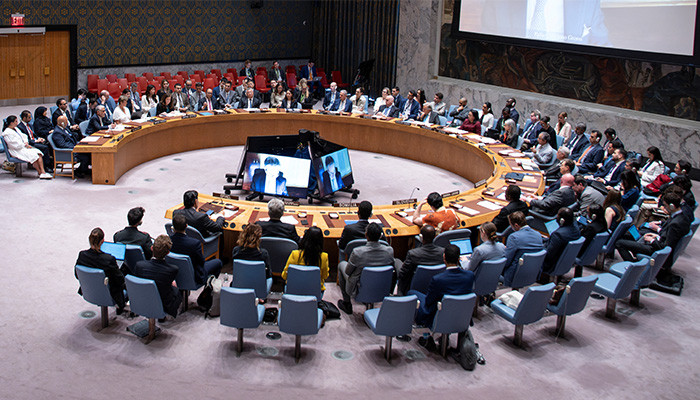Pakistan, China, and Russia Advocate for Ceasefire
Pakistan, along with China and Russia, has called for a cessation of Israeli hostilities, suggesting that the United Nations Security Council should approve a resolution demanding an immediate and unconditional ceasefire in the Middle East.
The regional tensions intensified after the U.S. declared it had “destroyed” key Iranian nuclear sites to prevent alleged nuclear development, joining Israel in the most significant Western military action against Iran since its 1979 revolution.
UN Secretary-General Antonio Guterres stated at the UN Security Council meeting that the U.S. bombing of Iranian nuclear facilities “represents a dangerous escalation.”
As the world anticipates Iran’s response to the U.S. strikes, the UNSC convened to address the situation following Tehran’s request, amidst missile strikes on Israel despite warnings from the U.S. of “far greater” consequences if hostilities persist.
China and Russia have denounced the U.S. strikes, while Pakistan has expressed support for Iran and its right to self-defense, citing breaches of international law.
The UN chief emphasized the necessity for an immediate ceasefire and a return to “serious, sustained negotiations.”
“The people of the region cannot endure another cycle of destruction. And yet, we now risk descending into a rathole of retaliation after retaliation,” he told the 15-member Council.
Iran’s UN Ambassador Amir Saeid Iravani accused both Israel and the U.S. of undermining diplomacy, asserting that all U.S. allegations lack foundation and that the nuclear non-proliferation treaty is being used as a political tool.
“Instead of guaranteeing parties’ legitimate rights to peaceful nuclear energy, it has been exploited as a pretext for aggression and unlawful action that jeopardise the supreme interests of my country,” Iravani told the council.
Meanwhile, Israel’s UN Ambassador Danny Danon commended the U.S. for its actions against Iran.
“This is what the last line of defense looks like when every other line has failed.” He accused Iran of using negotiations over its nuclear programme as camouflage to buy time to build missiles and enrich uranium.
“The cost of inaction would have been catastrophic. A nuclear Iran would have been a death sentence just as much for you as it would have been for us,” he told the council.
Pakistan’s Permanent Representative to the UN, Asim Iftikhar, addressed the 15-member body, noting that history indicates the use of force and unilateral military actions only intensify conflicts and exacerbate divisions.
“We must act now to prevent the situation from spiralling further out of control [….] Dialogue and diplomacy remain the only viable path forward,” Pakistan’s Permanent Representative to the UN Asim Iftikhar told the UNSC amid the increasingly volatile situation in the region.
Ambassador Iftikhar echoed the earlier statement by the Foreign Office, condemning U.S. bombings, supporting Iran’s right to self-defense, and criticizing the attacks on the nuclear sites as a “dangerous precedent and pose a grave threat to the safety and security of populations across the region and the world”.
The envoy denounced the attacks on IAEA-safeguarded facilities, stating that Islamabad has joined China and Russia in distributing a draft resolution that calls for an “immediate and unconditional ceasefire”.
The resolution further urges “all parties to refrain from further escalation; demands the urgent protection of civilians and civilian infrastructure; and supports a diplomatic path forward on the Iranian nuclear issue that is acceptable to all parties”.
Reaffirming Pakistan’s backing for Iran, the UN representative highlighted that the surge in tensions and violence resulting from Israeli actions was deeply concerning and that “any further escalation risks catastrophic consequences for the region and beyond”.
China’s UN Ambassador Fu Cong, in condemning the U.S. strikes, voiced a similar opinion that peace in the Middle East cannot be achieved through military force.
“Diplomatic means to address the Iranian nuclear issue haven’t been exhausted, and there’s still hope for a peaceful solution,” he added.
Meanwhile, Russia’s UN Ambassador Vassily Nebenzia recalled former US Secretary of State Colin Powell making the case at the UN Security Council in 2003 that Iraqi President Saddam Hussein constituted an imminent danger to the world because of the country’s stockpiles of chemical and biological weapons.
“Again we’re being asked to believe the US’s fairy tales, to once again inflict suffering on millions of people living in the Middle East. This cements our conviction that history has taught our US colleagues nothing,” he said.
While the timing of a council vote on the draft resolution remains unclear, the three nations have requested council members to provide their feedback by Monday evening. A resolution requires at least nine affirmative votes and no vetoes from the U.S., France, Britain, Russia, or China to pass.
The U.S. is anticipated to oppose the draft resolution, which also condemns assaults on Iran’s nuclear sites. The document refrains from naming the United States or Israel.
Following the strike on its nuclear facilities, the Iranian parliament has endorsed a measure to potentially block the Strait of Hormuz — a crucial global trade route.
Iran has criticized the U.S. for undermining ongoing diplomatic efforts with its attacks, while also appealing to the international community to adopt a firm stance, asserting that “global norms and diplomacy are under direct threat”.
“We were in the middle of negotiations,” FM Araghchi said. “It was not Iran that walked away. The US abandoned diplomacy with missiles, not words,” Iranian Foreign Minister Abbas Araghchi said during a press conference during the Organisation of Islamic Cooperation (OIC) summit in Istanbul on Sunday.



Comments (0)
No comments yet. Be the first to comment!
Leave a Comment